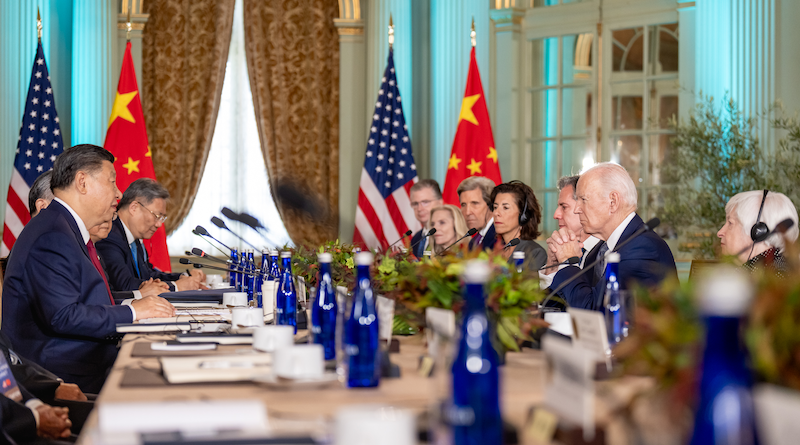Positive Chinese-American Relations Can Promote Global Stability – OpEd
By Arab News
By Maria Maalouf
US President Joe Biden’s meeting with Chinese President Xi Jinping during the Asia-Pacific Economic Cooperation forum in San Francisco last week was a good opportunity to stabilize and fix American-Chinese relations, and score a few measurable achievements. Yet, America’s foreign policy toward China will be constantly dominated by a sense of rivalry.
Historically, great strategic importance is attached to the US-China relationship. When a US administration tries to adopt a new approach on foreign policy, it is often said that critical decisions will be made regarding the course of American-Chinese relations. Nevertheless, the relationship between the US and China cannot be based solely on a state of confrontation between Washington and Beijing. It is a complex relationship that entails many areas of competition and the potential for cooperation on many issues. For instance, despite former President Donald Trump’s fiery rhetoric against China during the global pandemic, the two governments coordinated many policies to stop the spread of the virus and save lives.
The essence of Chinese-American politics is the need for a successful management of that relationship, and how to deal with pressing challenges that the two governments must handle at the present moment and in the near future.
As an example, on Nov. 21, China’s Foreign Minister Wang Yi welcomed foreign ministers visiting his nation from Saudi Arabia, Jordan, Egypt, Palestine, and Indonesia, as well as the head of the Organization of Islamic Cooperation. This was a mission to follow up the recommendations of the Riyadh Arab-Islamic summit seeking to end the war in Gaza. Wang told the visiting ministers that “the international community must act urgently, taking effective measures to prevent this tragedy from spreading. China firmly stands with justice and fairness in this conflict.” This Chinese diplomatic attitude contrasts with the endorsement of the Biden administration and the US Congress of Israel’s war against the Palestinians in Gaza.
Moreover, there is a totally different view between the US and China in reference to the character and the political standing of a number of major countries in East Asia. The US considers Japan, the Philippines, South Korea, and Taiwan as allies and friendly states.
China’s leaders, however, view these nations as countries that have had long historical strife with China, and as front-line states whose foreign policies and national security priorities pose a threat to Chinese sovereignty. For instance, there are disputes between China and Japan over the ownership of several small islands in the South China Sea. In addition, there are long-held claims by the Chinese government that Taiwan is part of a “one-China policy,” and that the island belongs to the People’s Republic of China.
These four Asian countries deserve credit for achieving huge economic growth and becoming viable nations on the world stage. However, their foreign policies frequently rely on seeking help from Washington to defend against an ascendant China.
The best course for the US is to adhere to the old treaties that were signed with these countries and honor its commitments to them, but also to explain to them and to the Chinese that things in world politics are changing, and such a change could allow for America’s bonds with these big countries in East Asia to evolve in a friendly direction. For instance, the US, China, Japan, the Philippines, South Korea, and Taiwan could cooperate to break the isolation of North Korea, and convince Pyongyang to stop its nuclear tests and the firing of ballistic missiles.
The US also must be more responsible in its foreign policy toward China. Washington’s announcements of weapons sales to India and Vietnam will be viewed by China’s leaders as an encirclement strategy designed to undermine their nation.
It is also becoming more common and convenient for many American politicians to blame China for everything wrong in the US, especially alleged technology thefts and the big trade deficit between the two countries. According to a report by the US Department of Commerce, “in 2022, both US exports to China and imports from China continued to grow for a third year in a row. US exports totaled $153.8 billion, an increase of 1.6 percent ($2.4 billion) from 2021; US imports from China totaled $536.8 billion, an increase of 6.3 percent ($31.8 billion); and the trade deficit with China was $382.9 billion, an increase of 8.3 percent of ($29.4 billion.)”
There is a tacit understanding that both countries have to find a mutually beneficial formula. The US must give China choices to help them reach good outcomes in world politics. The two nations could conduct serious talks on how to end the war between Russia and Ukraine. COP28 meetings in a few days in the UAE might be a good opportunity to promote bilateral cooperation in fighting climate change. There are many avenues of mutual interests that can bring about benefits to both China and the US. Ultimately, defining Chinese-American interdependence in positive ways will lead to more regional and global stability, and make the world more integrated.
- Maria Maalouf is a Lebanese journalist, broadcaster, publisher, and writer. X: @bilarakib

